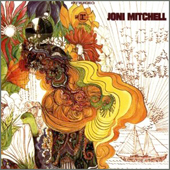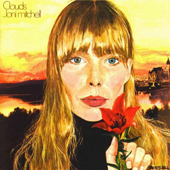Certain artists leave a mark on their time but very few survive it. The overwhelming majority of them accompany the era that gave them artistic birth into its dilution and its final deletion, when it is replaced by the new.
However, the works of a minority both mark their time and transcend it. The musical and literary works of Joni Mitchell, a unique Œuvre, belong to this minority, and thus escapes the dismal fate to which the passage of time seems to doom it. Apart from the quality of music, about which everything has already been said, the reason for this may well be the "introspective" aspects underlying the majority of the writings of this 'subterranean explorer of the soul' -and not the "confessional" ones, a label against which Mitchell has always rebelled, stressing that since she never did anything that she should be forgiven, therefore she never had anything to confess.
Writings that always reached way beyond the level of mere outpourings of some " Sister of the Broken Hearted" (a category into which it seemed so easy to store Joni Mitchell, and a lazy convenience in which many among the critics indulged, condemning the progress of her career's early stages). Above all, her transcendence lies in the fact that her writings expressed the uniqueness of an exceptional character, a very personal point of view and a quite clairvoyant perception of the realities of the human soul.
Her work has lost nothing of its relevance, as it is timeless and universal in its concerns. Questions related to youth that fades. To life that slips away. To love that tarnishes. With waivers depriving the first of its strength, with disillusionment that abuses the second by emptying it of its meaning, with compromises which corrupt the last.
All of these leaving the heart bruised with the bitter taste of disappointment and failure. All concerns that are universal because they are everybody's. Yours, mine. And will be those of the descendants of all the beings to whom life gave an offspring.
This work never was confined to a simple testimony, more or less opportunistic and clinging in phase with its epoch. It never bothered to consider solely the present moment, at least in its totality. Only a very tiny percentage of texts represent an exception to this rule, such as Ethiopia (from Dog Eat Dog in 1983), or The Fiddle and the Drum (Clouds, 1969).
It is therefore impossible to relate the work of Joni Mitchell to movements like the "Folk Song" (to which she never really belonged) and even less to the "Protest Song" with its fierce and somewhat naive criticism of the social or political system in force. A musical trend that marked many of her contemporaries' heyday -as the artists of the 60s, from Bob Dylan in some aspects to Joan Baez, who were its emblematic figures and since then embody, rightly or wrongly, these trends' legacies. Such identification with the era had the effect of dating the DNA of the entire movement, making its voice virtually inaudible for the following generations because of its obsolete claims.
"Don Juan's Reckless Daughter" resolutely escaped these traps, not by editorial policy or posture, but by pure nature and authenticity of character : those topics did not seem to interest her. Very simply, her atavism pushed her to relentlessly hunt down and dissect, in the manner of an anthropologist, the failings and cowardice, as well as the flamboyant flares inherent to the human condition.
© Jacques Benoit. Design, works, photographies and texts by Jacques Benoit and under the author’s copyright. Except when derived from other sources and then mentioned as such.

